Viagra (Sildenafil) and Erectile Dysfunction: Benefits, Myths, and Warnings
Written by Dr. Pranitha Bangera

Dr. Pranitha Bangera is a gold-medalist healthcare professional with an elite foundation in clinical training and patient care. A researcher at heart, she specializes in creating high-impact, research-driven medical content that empowers readers through accessible patient education. Dr. Bangera focuses on the intersection of digital health and clinical communication, specifically within the fields of sexual health and mental well-being. Her work is dedicated to making complex medical innovations understandable and trustworthy for a global audience.
•
September 20, 2025
Our experts continually monitor the health and wellness space, and we update our articles when new information becomes available.
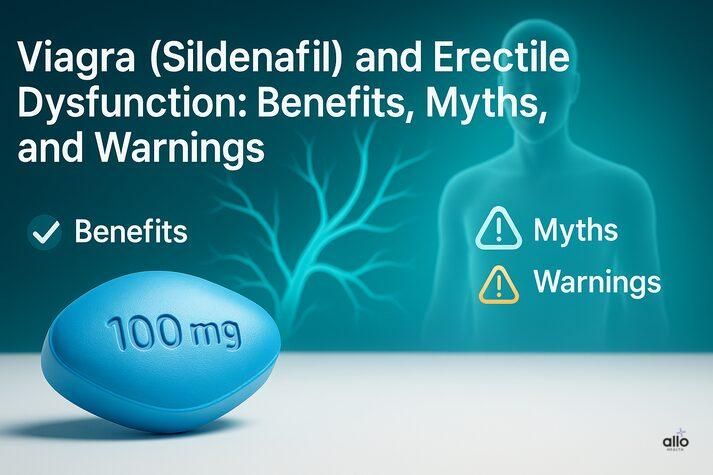
Quick Read
Viagra (sildenafil) is one of the most recognized and trusted treatments for erectile dysfunction (ED), proven effective in 62–82% of men. It works by boosting blood flow to the penis during arousal, helping men achieve and sustain an erection. Both branded Viagra and generic sildenafil 100 mg offer the same results, with generics being more affordable and widely available. Alongside its benefits, Viagra comes with important safety considerations. Common side effects like headache or flushing are usually mild, but serious risks like vision changes, priapism, or dangerous interactions with nitrates require caution. Many myths around Viagra are misleading: it does not cause ED, doesn’t boost libido, isn’t addictive, and only works with sexual stimulation. For best outcomes, it should be taken under medical supervision and combined with supportive measures like lifestyle improvements, hormone balance, and psychological counselling. Speaking to a qualified doctor is the safest way to decide if Viagra is right for you.
Erectile dysfunction (ED), also known as impotence, is one of the most common men’s sexual health concerns. For many, the first name that comes to mind for the treatment of this is Viagra. Viagra, or its generic form, sildenafil, has treated impotence in millions of men and helped them regain confidence in the bedroom. But along with its popularity come plenty of questions and myths: Does it really work? Is it safe for the heart? Will you become dependent on it? Does Viagra cause erectile dysfunction? In this article, we’ll walk you through everything you need to know about viagra tablet uses and side effects, how it works, including the proven benefits and common myths. We’ll also look at how it compares with Cialis and important safety warnings to look out for while using this drug.
What is Viagra?
Viagra is the well-known brand name for sildenafil citrate. It is a medicine that belongs to the class of drugs called PDE5 inhibitors (phosphodiesterase inhibitors). It was first approved by the U.S. Food and Drug Administration (FDA approval) in 1998. [1] It works by relaxing the blood vessels and improving blood flow to certain parts of the body, most notably the penis, during sexual stimulation. This action makes it one of the most widely prescribed treatments for erectile dysfunction (ED). Uses of Sildenafil:
- Viagra is primarily prescribed to help men achieve and maintain erections by improving blood flow during sexual stimulation.
- Under the brand name Revatio, sildenafil is FDA-approved to treat Pulmonary Arterial Hypertension (PAH), making it easier to exercise and slowing disease progression.
- In select cases, doctors may use it for blood flow problems after spinal cord injuries, prostate surgery, radiation therapy, or hormone treatments.[2]
While Viagra is the original branded version, there are now several generic sildenafil options available in the market.
Generic Viagra 100mg
Generic Viagra contains the same active ingredient as brand-name Viagra, sildenafil citrate, but is produced by different pharmaceutical companies. They are much more affordable than brand Viagra, making treatment accessible to more men.
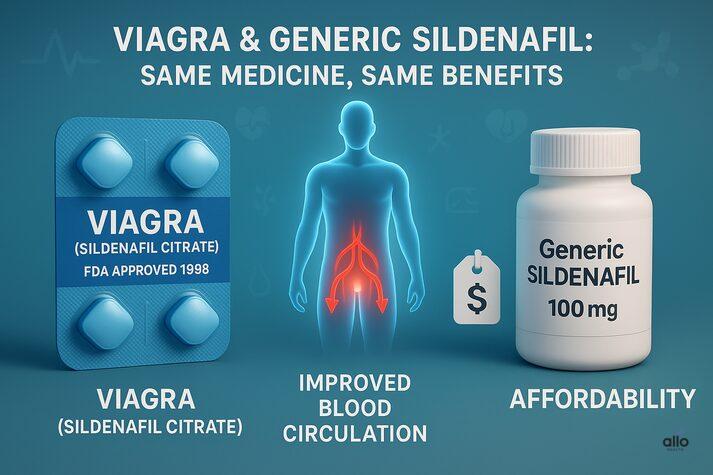
Viagra and Erectile Dysfunction
Primarily, Viagra is prescribed to treat erectile dysfunction (ED). To understand how it works, let us first understand how a normal erection takes place.
- When a man becomes sexually aroused, the brain sends signals to the nerves in the penis.
- In response, the penis releases a natural chemical called nitric oxide.
- This chemical relaxes the blood vessels in the penis, allowing them to widen and carry more blood flow into the erectile tissues.
- As these tissues fill up with blood, the pressure inside them increases, which traps the blood and prevents it from flowing back out immediately.
- This build-up of blood is what makes the penis firm and erect, ready for sexual activity.
- If any part of this chain is interrupted, a man may experience erectile dysfunction.
In men with erectile dysfunction, this process is often disrupted due to poor blood circulation, medical conditions, or other factors.
How Does Viagra Work?
- Viagra contains the active ingredient sildenafil citrate.
- It targets the natural erection process and helps restore it.
- When a man is sexually aroused, the body releases nitric oxide, which triggers the production of cGMP (cyclic GMP), a chemical that relaxes the blood vessels in the penis and allows blood to flow in.
- Normally, an enzyme called PDE5 (Phosphodiesterase type 5) breaks down cGMP.
- Viagra blocks PDE5, preventing cGMP from breaking down too quickly. [3]
- As a result, cGMP levels stay higher for longer, and the effect of nitric oxide is boosted.
- This keeps the blood vessels relaxed and open, allowing more blood flow into the penis.
- With increased blood flow during sexual stimulation, it becomes easier to achieve and maintain an erection.
Allo asks
Have you or your partner ever used Viagra for ED?
Benefits of Viagra for ED
Viagra is one of the most extensively studied treatments for erectile dysfunction (ED), with benefits supported by decades of clinical trials and patient experience. Beyond improving erections, it also impacts emotional well-being, relationships, and even overall health.
The Physical benefits of Viagra include:
- Improved Erectile Function: Clinical studies, including those using the International Index of Erectile Function (IIEF), show Viagra is effective in 62–82% of men, depending on dosage. [4]
- Enhanced Blood Flow: Improves circulation not just in the penis, but also throughout the body, supporting healthier vascular function.
- Restored Function After Surgery: In some men, Viagra has shown positive results in restoring erectile function following prostate surgery or radiation therapy. [5]
Viagra can also provide psychological benefits, like:
- Confidence boost: Restores self-esteem and reduces the stigma around ED.
- Reduced performance anxiety: Breaks the cycle of worry and ED, especially in men with anxiety-related erection problems.
- Improved sexual satisfaction: Helps both men and their partners enjoy a more fulfilling sex life.
- Strengthened relationships: Better sexual performance can improve intimacy and strengthen emotional bonds.
- Reduced Depression: Studies suggest treating ED can ease symptoms of depression linked to sexual dysfunction.[6]
Viagra can also improve cardiovascular health by:
- Lowering the risk of heart attacks and cardiovascular events.
- Reducing heart rate and improving overall cardiac performance.
- Supporting healthier blood vessels and circulation.
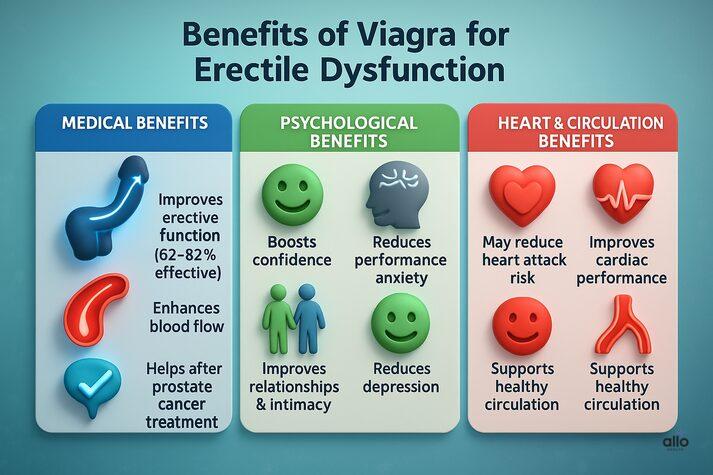
Important Safety Warnings About Viagra
While Viagra is safe and effective for many men, it is not without side effects and risks. Knowing what to expect and when to seek medical help is essential.
Common Side Effects (Usually Mild to Moderate)
These are the most frequently reported side effects, often temporary and improving within the first week:
- Headache (about 1 in 4 users)
- Flushing (warmth, redness of the skin)
- Nasal congestion (stuffy nose)
- Indigestion (upset stomach)
- Dizziness
- Back pain or muscle aches
- Mild vision changes (blue-tinted vision, light sensitivity)
- Nausea
Serious Side Effects (Requires Immediate Medical Attention)
1. Vision Problems:
Rare cases of NAION (Non-arteritic anterior ischemic optic neuropathy) may cause sudden vision loss.
2. Hearing Loss:
Sudden hearing loss ("Viagra deafness") usually affects one ear within 24-48 hours of taking Viagra
3. Priapism:
Prolonged, painful erections lasting more than 4 hours can cause permanent penile damage if untreated.
4. Cardiovascular Risks:
Severe Hypotension: Can cause dangerous drops in blood pressure, especially when combined with nitrates or certain heart medications.
Key Drug Interactions and Safety Considerations
- Never combine with nitrates, as it can cause a drop in blood pressure, which can be dangerous. [7]
- Taking nitrites (such as those found in “poppers”) together with Viagra can cause a dangerous drop in blood pressure, and in some cases, this can be life-threatening.
- Use with caution if taking with Alpha-blockers or CYP3A4 inhibitors (ketoconazole, erythromycin) as these can intensify side effects or raise Viagra levels.
- Never combine with other PDE5 inhibitors.
- Never take with grapefruit juice as it can increase levels of Viagra in your body, which may increase your risk of side effects. [8]
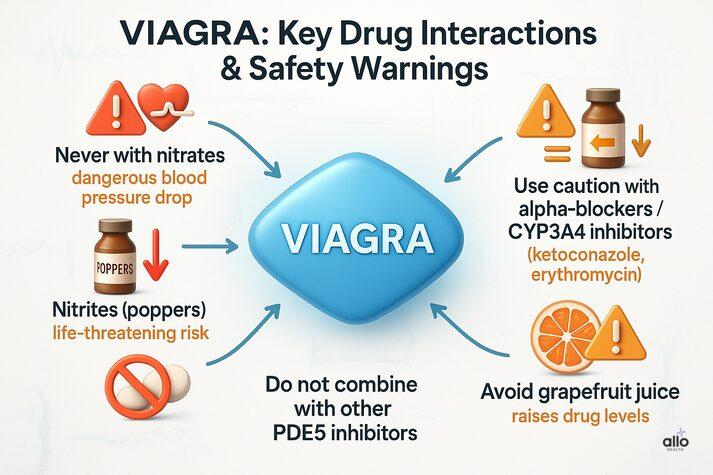
Myths Around Viagra and Erectile Dysfunction
When it comes to Viagra and erectile dysfunction, there are plenty of myths and misconceptions that often confuse people. Let’s break down the most common ones with the facts:
1. Viagra Can Cause Erectile Dysfunction.
A frequent concern is whether Viagra itself can cause erectile dysfunction. The answer is no. Viagra does not directly cause ED. In fact, it helps improve blood flow and supports erections. However, relying on Viagra without addressing underlying health or psychological issues may create a psychological dependence, where men feel they can’t perform without it. In such cases, psychological counseling or sex therapy can be very helpful, as it addresses performance anxiety and restores confidence without over-reliance on medication.
2. Taking Viagra Without Erectile Dysfunction
Some men think about taking Viagra “just in case” or as a recreational aid, but this can be risky and unnecessary. If you don’t have erectile dysfunction, Viagra will not improve your performance. It won’t increase sexual desire, make you more aroused, or automatically help you last longer. Instead, using it without a medical need may actually backfire, leading to performance anxiety or the belief that you can’t perform without the pill. Over time, this can create a cycle of dependence. In such situations, sex therapy is often more beneficial than medication, as it helps address underlying worries more healthily.
3. All Viagra Sold Online Is Safe
One of the biggest risks today is the availability of fake or unregulated Viagra sold online or through direct-to-consumer marketing. Counterfeit pills may contain the wrong dose, harmful substances, or no active ingredient at all, posing serious health risks. Always purchase Viagra or generic sildenafil from a licensed pharmacy with a doctor’s prescription to ensure safety and effectiveness.
4. Viagra Increases Sex Drive (Aphrodisiac)
Viagra does not increase sexual desire or libido. It is not an aphrodisiac and will not make you “horny” or enhance fantasies. Viagra requires sexual arousal to work. It only helps with the physical process of erection by increasing blood flow.
5. Viagra Works Instantly
Viagra doesn’t produce immediate erections. It usually takes 30–60 minutes to start working and remains effective for up to 4 hours. It may also take several attempts before it works reliably, so doctors often advise trying it up to 8 times before deciding if it’s effective for you.
6. Viagra Causes 4-Hour Erections
The myth about prolonged erections is false. While Viagra remains active in your system for 4-5 hours, this doesn't mean you'll have a continuous erection. The medication only helps you achieve and maintain erections during sexual arousal. Priapism (erections lasting more than 4 hours) is extremely rare but requires immediate medical attention.
7. Viagra Causes Heart Attacks
Viagra does not increase the risk of heart attacks in healthy men. It was originally developed for heart conditions, and research shows that, when prescribed correctly, it is generally safe. However, men with serious cardiovascular disease or those taking nitrate medications must avoid Viagra due to dangerous blood pressure interactions.
8. Viagra Is Addictive
Viagra is not chemically addictive. It does not alter brain chemistry like addictive drugs. Taking Viagra does not mean you’ll be dependent on it permanently. Many men use it temporarily while addressing the underlying causes of erectile dysfunction. With treatment, lifestyle changes, or therapy, some men eventually no longer need it. However, some men may develop a psychological dependence on the confidence it provides, which is different from true addiction.
Many men worry that once they start taking Viagra, they’ll need it forever. That’s not true. It’s only a temporary tool that will help you while you figure out other lifestyle factors.
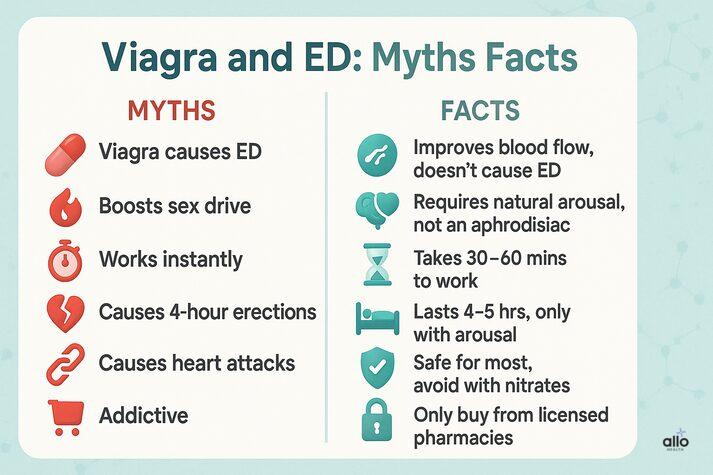
Difference between Viagra and Cialis
Viagra (sildenafil) and Cialis (tadalafil) are both PDE5 inhibitors used to treat erectile dysfunction, but they differ in duration, flexibility, food interactions, and some side effects. Here is a table that explains this in brief:
Feature
Viagra (Sildenafil)
Cialis (Tadalafil)
Active Duration
4–6 hours
Up to 36 hours
Onset of Action
30–60 minutes
30 minutes – 2 hours
Food Interaction
Less effective after high-fat meals
Not affected by food
Dosing Options
25, 50, 100 mg as needed before sex
5–20 mg as needed, or daily low dose (2.5–5 mg)
Unique FDA Approvals
Approved only for erectile dysfunction
Approved for erectile dysfunction and benign prostatic hyperplasia (BPH)
Side Effects
Headache, flushing, nasal congestion, dizziness, mild vision changes (blue/green tint)
Headache, indigestion, back pain, runny nose (visual side effects are rare)
Visual Effects
May cause temporary color vision changes (light sensitivity)
Rarely associated with visual disturbances
Lifestyle Flexibility
Works best for planned sexual activity
Preferred for spontaneity and frequent sexual activity
Daily Use
Not available as a daily option
Available as a daily low dose
Conclusion
Viagra has become one of the most trusted treatments for erectile dysfunction, helping millions of men regain their sexual confidence and improve their quality of life. It works by improving blood flow to the penis, but it is not a magic pill. It only works with sexual stimulation and should always be used under medical guidance. Understanding the facts, benefits, potential risks, and drug interactions is the best way to use it safely and effectively. Supportive measures like lifestyle changes, hormone balance, and psychological counseling can greatly enhance the effectiveness of Viagra in managing ED. If you are suffering from ED, the most important step is to speak with a qualified healthcare professional. They can help determine the right dose, check for underlying health conditions, and guide you toward a treatment plan that not only addresses the issue but also improves your overall well-being.
Disclaimer
The following blog article provides general information and insights on various topics. However, it is important to note that the information presented is not intended as professional advice in any specific field or area. The content of this blog is for general educational and informational purposes only. The content should not be interpreted as endorsement, recommendation, or guarantee of any product, service, or information mentioned. Readers are solely responsible for the decisions and actions they take based on the information provided in this blog. It is essential to exercise individual judgment, critical thinking, and personal responsibility when applying or implementing any information or suggestions discussed in the blog.
Most Asked Questions
How long does Viagra take to work?
Viagra usually starts working within 30 to 60 minutes. It remains effective for up to 4 hours, but it only works when you’re sexually aroused.
Is Viagra addictive?
Viagra is not chemically addictive. Some men may develop a psychological dependence on it for confidence, but this is different from physical addiction.
What happens if I take Viagra without erectile dysfunction?
If you don’t have ED, Viagra won’t boost sexual desire or make you perform better. In fact, it may cause unnecessary side effects or even performance anxiety over time.
How often can I take Viagra?
Viagra should only be taken once in 24 hours, and always in the dose recommended by your doctor. Overuse can increase the risk of side effects.
Should I see a doctor before starting Viagra?
Absolutely. A doctor can check for underlying causes of ED, make sure Viagra is safe for you, and prescribe the right dose. Self-medicating can be risky.
Sources
- 1.
FDA, U.S. Food and Drug Administration
- 2.
Sildenafil in the treatment of sexual dysfunction in spinal cord-injured male patients
- 3.
Sildenafil: MOA
- 4.
Oral sildenafil (Viagra™) in male erectile dysfunction: use, efficacy and safety profile in an unselected cohort presenting to a British district general hospital.
- 5.
Treatment of erectile dysfunction with sildenafil citrate (Viagra) after radiation therapy for prostate cancer
- 6.
Efficacy of sildenafil citrate (Viagra) for the treatment of erectile dysfunction in men in remission from depression
- 7.
Effects of Sildenafil Citrate (Viagra) Combined With Nitrate on the Heart
- 8.
Effects of grapefruit juice on the pharmacokinetics of sildenafil


